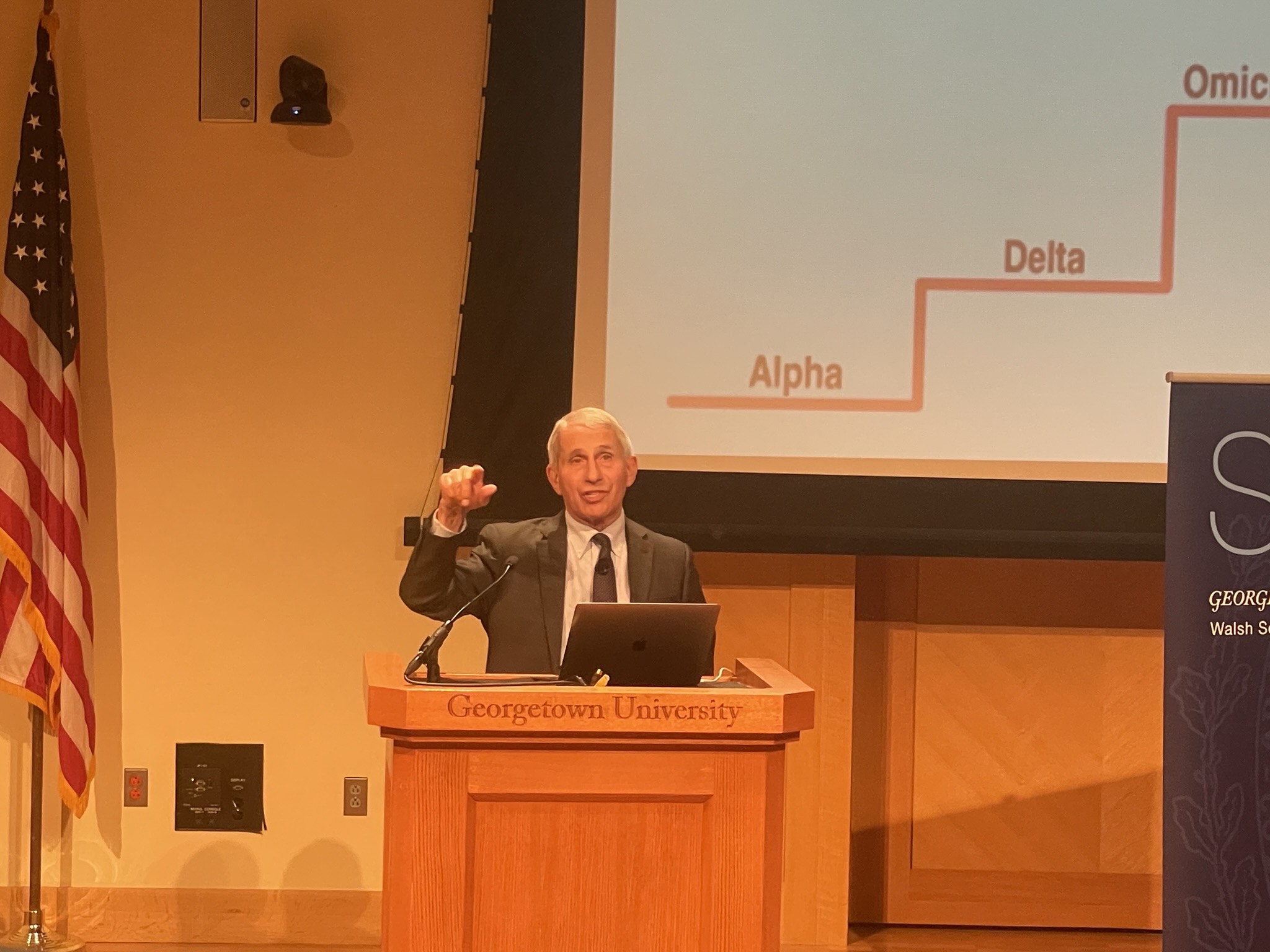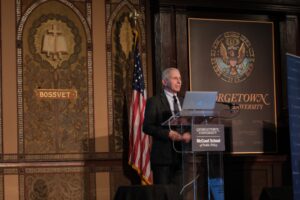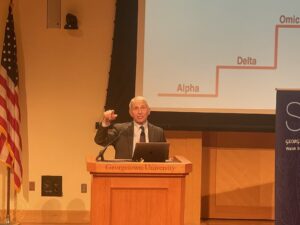Renowned immunologist and infectious disease researcher Dr. Anthony Fauci will join Georgetown School of Medicine as a Distinguished University Professor, the university announced Monday morning.
Fauci was offered the school’s highest professional honor due to his extraordinary achievement in scholarship, teaching, and service, and will join both the Division of Infectious Diseases in the Department of Medicine and the McCourt School of Public Policy starting July 1.
“Dr. Fauci has embodied the Jesuit value of being in service to others throughout his career, and we are grateful to have his expertise, strong leadership, and commitment to guiding the next generation of leaders to meet the pressing issues of our time,” Georgetown University President John J. DeGioia said in the announcement.
Fauci joins Georgetown’s faculty following 54 years in public service, most notably serving as the nation’s leading immunologist, infectious disease researcher, and advisor to seven U.S. presidents. He rose to prominence for his research during the HIV/AIDS pandemic, and was voted one of the most influential people of 2020 by Time Magazine due to his leadership during COVID-19.
“We are honored to have such a distinguished practitioner, one who faced and navigated some of the world’s most pressing issues, to guide our students in becoming transformative global leaders,” Maria Cancian, dean of the McCourt School of Public Policy, said.
In a Q&A with Georgetown, Fauci discussed the reasons he chose to accept a position at Georgetown over a series of offers from other universities, institutions, and companies.
“First of all, I wanted to stay in Washington, DC. But I also wanted to be involved in what would be a community–a community of academics, a community of students–in a medical center that’s well-known and respected, and have the opportunity to do both medicine and public policy,” he said.
In December 2022, Fauci stepped down from his role as director of the National Institute of Allergy and Infectious Diseases at the National Institutes Of Health (NIH) after 38 years in the position. He then took a few months to think about his next steps.
“I knew it was the right time to step down because I said to myself, I’m still quite energetic. I’m still very enthusiastic, and I’m passionate about doing something with the next several years while I still had, as they say, a lot of gas in my tank and a lot of energy,” he said.
“I’m excited about putting together the overlap of medicine and public policy. And developing collaborations at various levels, particularly with students, and I mean all students–I don’t mean just medical students,”
Fauci has engaged with Georgetown students over the years, including leading a virtual conversation on COVID-19 in 2020, and outlining 10 lessons to be learned from the pandemic during Georgetown’s 2023 Maloy Distinguished Lecture. But his connection to the school runs deeper, tracing back to his wife, Christine Grady (NHS ’74, G ’93).
“My wife graduated from undergraduate here. She got her Ph.D. in philosophy here. We were married in Dahlgren Chapel. Our three daughters were born at Georgetown Hospital, and I live 10 blocks away,” he said. “It was pretty easy to make that decision. Kind of a no-brainer.”
The physician’s alignment with Georgetown’s values also stems from his time at two other Jesuit institutions: Regis High School in New York City and the College of the Holy Cross.
“I am delighted to join the Georgetown family, an institution steeped in clinical and academic excellence with an emphasis on the Jesuit tradition of public service,” Fauci said. “This is a natural extension of my scientific, clinical and public health career, which was initially grounded from my high school and college days where I was exposed to intellectual rigor, integrity and service-mindedness of Jesuit institutions.”
“My advice has always been to students, be they college students or medical students or professional students like law students or people involved in policy, is work hard but keep an open mind and be flexible for the appearance of unexpected opportunities.”
Looking to the future after a 38 year career at the NIH, Fauci hopes to make an impact on Georgetown’s community by imparting his knowledge to the next generation.
“I ask myself, now, at this stage in my life, what do I have to offer to society? Sure, I could do more experiments in the lab and have my lab going, but given what I’ve been through, I think what I have to offer is experience and inspiration to the younger generation of students,” he said.
“If I accomplish that, I think I’ll make a major contribution to Georgetown.”







